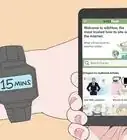This article was co-authored by Laura Marusinec, MD. Dr. Marusinec is a board certified Pediatrician at the Children's Hospital of Wisconsin, where she is on the Clinical Practice Council. She received her M.D. from the Medical College of Wisconsin School of Medicine in 1995 and completed her residency at the Medical College of Wisconsin in Pediatrics in 1998. She is a member of the American Medical Writers Association and the Society for Pediatric Urgent Care.
This article has been viewed 46,131 times.
Texting is a great way to quickly communicate. Unfortunately, the convenience of texting can lead to a texting addiction. If you feel anxious when you are not checking your phone and need to constantly message your friends, you might be addicted to texting. Making it more difficult to find ways to text, having better social interactions, and building better phone habits can help you beat your addiction to texting.
Steps
Creating Better Phone Habits
-
1Put your phone away an hour before you go to sleep. Staring at a screen right before you try to go to sleep is going to make it more difficult to fall asleep. An hour before you go to sleep, text anyone you are talking to that you are going to sleep. Then take your phone out of your room and put it somewhere where it is safe, but far away from you. Don’t try to sleep with it right next to your head because you will spend more time focused on who might be texting you than sleeping.[1]
- If you normally use your phone as an alarm clock to wake you in the morning, it's time to invest in an alarm clock instead.
-
2Carry your phone in your bag or pocket. When you take your phone with you places, don’t carry it in your hand. Put your phone somewhere where you can’t see it. This is especially important when you drive. Texting and driving is very dangerous to you and everyone you share the road with. Make sure your phone is hidden away when you drive so you are not tempted to look at it and text.[2]Advertisement
-
3Have set times where you are away from your phone. Think of the best times of the day for you to not be on your phone texting (at work, at school, when you do your homework, etc.) and make it a “no phone time.” Turn your phone completely off and put it away somewhere where you can’t get to it for a few hours. Forcing yourself to do this daily will allow you to be more productive and help train your brain to not get anxious when you are not on your phone.
- Designate certain periods of the day where it is okay to be on your phone and try to stick to only those times to text.[3]
- You might want to hand your phone to a parent during these times and ask them to give the phone back at the end of "no phone time."
-
4Pretend like your cell phone is a home phone. Probably one of the major reasons you are addicted to texting is because you can take your phone with you anywhere. Try pretending like your cell phone is a landline phone. Place it in one spot in your house and always leave it there and only use it there, instead of taking it with you everywhere you go.[4]
- You can do this for a little while to train your brain not to check your phone constantly and then eventually start bringing it places with you again.
Changing Your Social Interactions
-
1Find a good texting balance. You don’t need to lose friends or damage relationships because you are trying to text less. You can still respond to texts and have social interactions with your friends, just try to limit yourself. Use your phone as a resource to make plans and keep in touch, but not as an activity that consumes your life.
-
2Explain to your friends that you are trying to quit texting. Tell your friends, family, and boyfriend or girlfriend to only text you if it is important. Ask them to only text you if something important comes up or they want to make plans to see you. Tell your friends not to text you just to talk too much while you are trying to fix your texting addiction. Explain to your friends you are going to be slower at replying because you are trying to use your phone less.
- Say something like: “I am trying to text less and need your help. Please only text me if it is important or you are trying to make plans with me, not just to talk. This will really help me get over my texting problem! I will also reply slower than usual".
-
3Make phone calls. Just because you are trying to text less does not mean you have to miss out on socializing with your friends. Instead of texting your friends to make plans or to catch up, call them. This will allow you to still be in the loop, but not feed into your texting addiction. A quick phone call can contain as much information as 30 minutes of texting and can help you to not addictively stare at your screen all day.
-
4Have face-to-face interactions. Force yourself to set your phone aside and focus on the world and people around you. Instead of texting through dinner, put your phone down and ask your parents about their day. Talk to your friends and family in person more often. Instead of texting your friends all day, text them once asking if they want to hang out. Then you can talk to them all day in person instead of over the phone.
- Don’t hide behind your phone in uncomfortable social situations. Instead of using your phone as a safety net, try putting it away and talk to the people who are around you.[5]
-
5Take a break from socializing. Even if you are a social butterfly, sometimes you should put your phone away and take a break from people. Read a book, study, lay in the grass outside, or watch a show instead of texting. Think of your break from texting as an opportunity to not have to worry about what your friends and family are doing all the time and to just focus on yourself.
Changing Your Access to Texting
-
1Ask your parents to monitor your texting. Recruit your parents to help you with your texting addiction. Explain to them that you are trying to text less and that you want them to monitor your usage. It might seem embarrassing or childish to ask your parents for help, but if they help you set ground rules and stick to them it will help you text less. You can also ask them to get mad or even punish you if they see you texting too much or if the number of texts you send each month does not go down.[6]
- You could even make a deal where you have to pay them a certain amount for each text, and the money goes into a college account.
-
2Change your phone plan. You, or your parents, can change your phone plan so you text less. If you have an unlimited phone plan, you’re more likely to text too much. Change your phone plan to allow fewer texts and fewer data per month. This is a good way to force yourself to text less.
-
3Delete texting apps off of your phone. Apps such as Kik, WhatsApp, and Facebook Messengers will only feed into your addiction since they can be used for free with Wi-Fi. Delete all of the messaging apps that you can off of your phone. You won’t be tempted to use them if they are not on your phone.
-
4Turn off the internet. Texting with an iPhone uses an app called iMessage. This uses the internet to text. Many other texting apps also use the internet to text. Turn your Wi-Fi off for at least some of the day so you are not tempted to text. Go into your phone settings and turn off your cellular data too. This way you will have no way of receiving and sending text messages through the internet.
-
5Disable notifications. Although you will probably still feel the need to check your phone obsessively, turn off all texting notifications on your phone. On many phones you can make it so your phone does not make any noise, so nothing pops up on your screen, and even so there is no way of knowing at all that you got a new message unless you go into the texting app.[7]
References
- ↑ https://www.psychologytoday.com/blog/rewired-the-psychology-technology/201501/go-the-fk-sleep-without-your-technology
- ↑ https://www.psychologytoday.com/blog/rewired-the-psychology-technology/201501/iphone-separation-anxiety
- ↑ http://www.teensafe.com/blog/is-your-teen-a-smartphone-addict/
- ↑ http://thenextweb.com/lifehacks/2015/02/28/how-to-stop-checking-your-phone-like-an-addict/
- ↑ https://www.psychologytoday.com/blog/rewired-the-psychology-technology/201504/heres-not-looking-you
- ↑ http://www.teensafe.com/blog/is-your-teen-a-smartphone-addict/
- ↑ http://thenextweb.com/lifehacks/2015/02/28/how-to-stop-checking-your-phone-like-an-addict/
-Step-1.webp)
-Step-2.webp)
-Step-3.webp)
-Step-4.webp)
-Step-5.webp)
-Step-6.webp)
-Step-7.webp)
-Step-8.webp)
-Step-9.webp)
-Step-10.webp)
-Step-11.webp)
-Step-12.webp)
-Step-13.webp)
-Step-14.webp)








-Step-17.webp)



















































